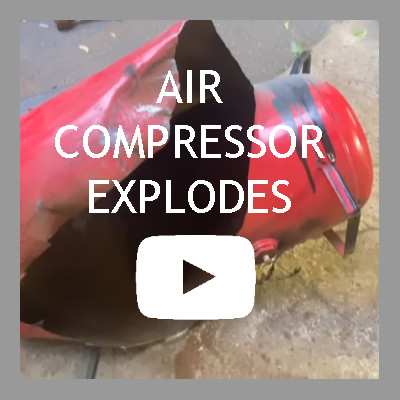Yes, air compressors can blow up. Air compressor explosions are most commonly caused by substantial corrosion of the compressor tank. Excessive condensation leads to corrosion, and you can avoid this outcome by monitoring and servicing the compressor and its auxiliary components.
Air compressors are essential components of manufacturing plants, auto repair shops, and residential workshops. Air-driven power tools are a vital part of most industrial manufacturing. It is an indispensable tool of the industrial world and helpful addition to a homeowner’s tool collection.
Air compressors do not pose the same risks to your safety as natural gas or propane, but without proper maintenance and monitoring, compressor explosions can cause massive damage. With appropriate safety measures and adequate training, you can safely use air compressors without fearing a spontaneous explosion.
Are Residental air compressors less dangerous?
Working with air compressors at home can be more deadly than larger commercial units. Regular inspections and maintenance are not performed on air compressors in use at home, and they are often stored in the same area that you are working in, like a garage or a shed. This makes residential accidents more frequent and hazardous.
The following list identifies common reasons for compressor explosions.
- Tank Corrosion
- Faulty Pressure Relief Valve
- Faulty Pressure Shut Off Switch
- Nearby equipment igniting or exploding
- Improperly installed tanks and valves
- Insufficient compressor lubrication
- Lack of cooling
- Manufacturing defect
Tank Corrosion
Corrosion will weaken the compressor tank. If your tank becomes corroded, it cannot sustain the high pressures produced by the compressor. When the compressor runs, condensation begins to form on the inside of the tank.
If you do not drain the tank regularly, the condensation buildup in the tank will lead to corrosion. Experts recommend draining the tank after each use and releasing the air pressure from the tools attached to the compressor.
The thickness of the tank’s metal determines whether it is capable of sustaining high pressure. Corrosion weakens the tank’s metal and reduces its structural integrity. If rust caused by corrosion decreases the tank’s thickness, the tank is unable to withstand the high-pressure demands of the compressor.
Nearby Equipment Ignition or Explosion
Another situation that may lead to a compressor explosion is overheated nearby equipment. Air compressors should not be installed or used in a confined space with poor ventilation.
If you have a furnace in your shop or business, you should not install a compressor near it in case the furnace fails or ruptures. Compressors must be stored and used in a cool, dry location. Intense heat can weaken the compressor tank and lead to a catastrophic accident—a small explosion from one piece of equipment setting off a larger one by rupturing the compressor’s tank.
Improper Installation
The manufacturers of air compressors include specific guidelines for the safe use of their products. If you purchase a compressor for your personal use, always follow the maker’s specs for maximum psi levels and maintenance routines. Over-clocking a compressor’s pressure switch will result in higher pressure and longer use times but may also result in death.
Professionals install large compressors for commercial uses. Installers are required to follow strict protocols when installing their compressors, and any mistakes they make can potentially cause a rupture or explosion.
Local authorities are responsible for inspecting these installations, but it’s a good idea to double-check the work performed by a professional installer.
Make sure the compressor tank’s drain valves are correctly installed, the compressor’s psi output does not exceed the limits of the tools it’s attached to, and the machine’s oil capacity is at the maximum level.
Insufficient Lubrication
If your compressor is not correctly lubricated, it cannot operate at an optimal level. Lubrication prevents friction from occurring between moving parts.
An excessive amount of friction raises the part’s temperature and forces oil deposits into the valves. The heat increase can cause a component to fail and eventually lead to a rupture or explosion. Dried oil in the valves can heat up and ignite.
This scenario will only occur if the compressor runs for an extended period without sufficient lubrication, but it’s a danger that you can easily avert by monitoring the machine’s oil level.
You can avoid any problems with lubrication by regularly checking the oil and replacing the oil when it becomes dark and less viscous.
Insufficient Cooling
You’re unlikely to have cooling problems with the small compressors you use in your workshop. However, large commercial machines rely on cooling systems to keep compressors functioning at a safe level. If a compressor is not adequately cooled, it can overheat and explode.
A cooling system for large compressors must be serviced and monitored regularly. Employers must provide a log that indicates when and how frequently maintenance should be performed on the system.
Insurers often require employees to keep up-to-date logs. A company’s insurance rates can increase if proper records are not kept.
Manufacturing Defects
Compared to other potential risks associated with air compressors, manufacturing defects rarely occur. If you notice a valve or component from the compressor does not correctly fit, stop the installation and contact the manufacturer.
Engineers design the compressor’s components to withstand extreme pressure. Each piece of the machine has a threshold for wear and tear. If a part is too thin or incorrectly machined, the compressor cannot function at peak performance and may fail.
An air-flow blockage caused by a defective part may cause the compressor to overheat and possibly explode.
How to Prevent Air Compressors from Blowing Up
In order to avoid a catastrophic explosion, you can follow a few steps to ensure your compressor operates at a safe level.
- Drain the tank after each use.
- Check the oil and lubricant levels (Oil-free compressors use gel lubricants)
- Place the compressor in a ventilated area.
- Follow manufacturer guidelines concerning Max Pressure
- Make sure all components are secure and undamaged
Drain the Tank

(This is the most common cause of tank failure)
After you finish a project with your air compressor, turn off the machine and drain the tank. Each compressor tank has a different location for the drain valve. If you fail to drain the tank, condensation can build up and corrode the inside of the tank.
You should also bleed the air out of the attached hoses. Turn the compressor off, and pull the trigger on the wand until you hear the air escape. Bleeding ensures the longevity of your hoses and attachments. If the hoses are stored under pressure, they can crack and break.
Check the Oil
Oil-free compressors do not require as much maintenance as oiled compressors. However, you should frequently monitor the lubrication of an oil-free machine. Oil-free machines use synthetic gel lubrication on some parts, and some manufacturers claim these machines are maintenance-free, but dirt may build up on the surface and cause premature wear. This is the leading reason oil-less compressors have a shorter life span.
When you use a compressor indoors, make sure the room is ventilated. Air compressors need a steady flow of air to operate effectively.
You should also avoid blocking the machine’s air intake with nearby equipment or supplies. A dirty rag thrown over the compressor can cause it to overheat and malfunction.
Follow Manufacturer’s Guidelines
Always follow the exact manufacturer guidelines when you install and operate your air compressor. If your machine is not rated to handle pressures above 120 psi, do not try to push the compressor’s pressure above that level.
The machine’s tank can rupture if the pressure is too high. A ruptured tank can take off like a rocket and cause massive damage and injuries.
Check All Components For Damage
Check your valves, hoses, connections, and tank for any visible damage. If you notice a cracked hose or plugged valve, replace them.
Closing Remarks
Air compressors are essential machines for manufacturers, auto shop painters, dentists, and hobbyists. It’s crucial to frequently service the compressor and monitor its performance if you want to avoid an accident.
Performing a brief series of safety checks and remembering to drain the tank after each use is all you have to do to ensure a safe, efficient air compressor. So, grab your compressor and supplies. Now you can finish the project you’ve been thinking about since last week.

